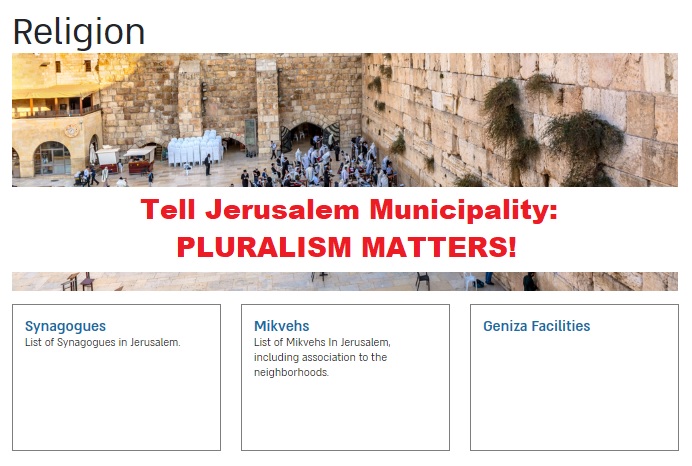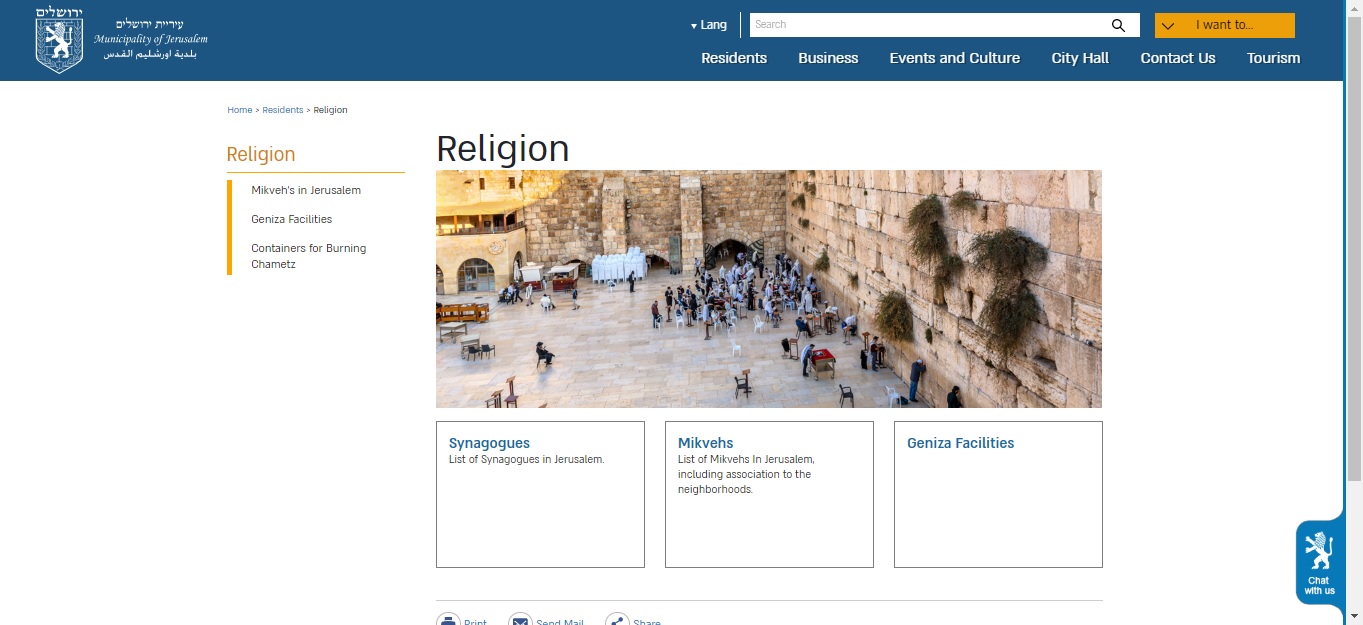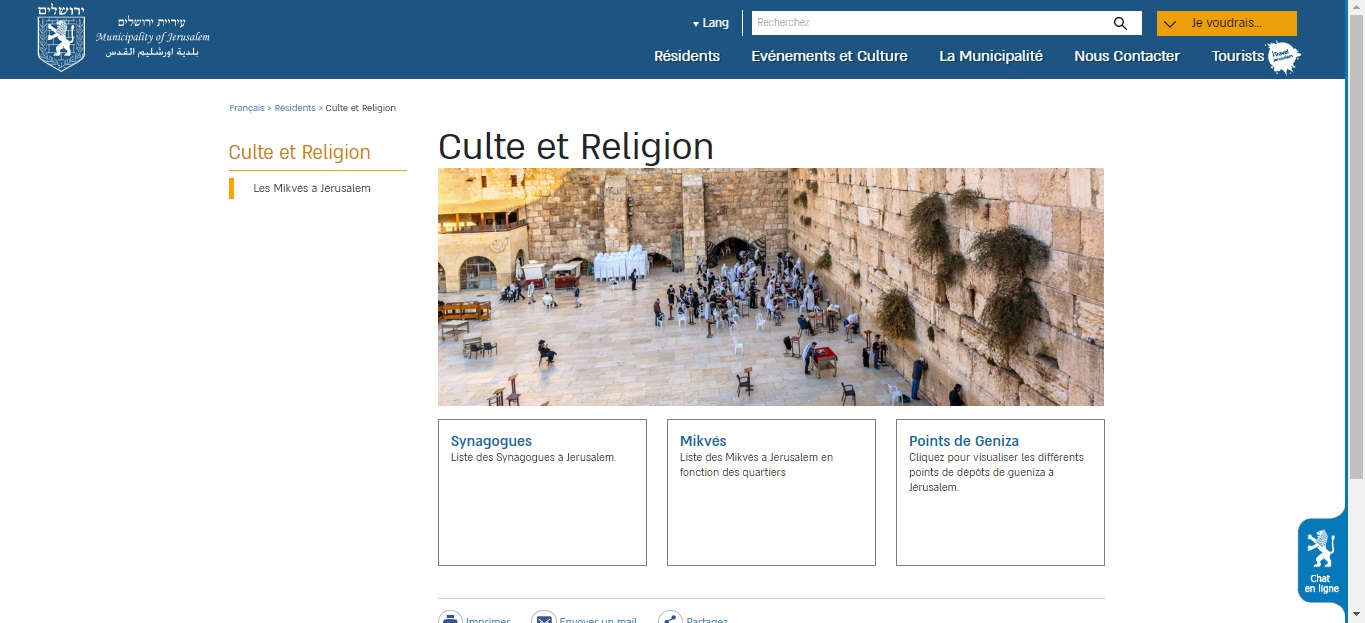Municipality refuses to include non-Orthodox Jerusalem synagogues
Hiddush fighting for pluralism in Jerusalem
The Jerusalem Municipality deleted the list of synagogues in the city from the municipality's website in order to avoid publicizing non-Orthodox synagogues and non-Jewish houses of worship – Hiddush launching a worldwide petition drive and planning further legal action.
16/07/2020 12:22
Tags: Jerusalem · Jerusalem municipality · legal action · discrimination · non-Jewish · non-Orthodox · pluralism

Join us in protesting Jerusalem's decision to eliminate all synagogues
from its website just to avoid listing non-Orthodox and Modern Orthodox!
Following a petition submitted by Hiddush against the Jerusalem Municipality, demanding equal treatment for Jerusalem synagogues of all denominations, including Reform, Conservative, Modern Orthodox, as well as for Muslim and Christian houses of worship, the municipality completely removed the list of Orthodox synagogues from the “Religion and Tradition” section of its website
The Jerusalem Municipality was required to respond by July 12, 2020 to a petition submitted by Hiddush- for Religious Freedom and Equality against its discriminatory and illegal policy on publicizing houses of prayer and religious institutions. Instead, knowing that it was unlikely that they could legally defend this long-standing discrimination, the municipality entirely removed the list of synagogues from its website. This disturbing move was a 180-degree reversal from the offer the Jerusalem Municipality’s Legal Department made to Hiddush, proposing that its online list be updated as demanded, with Hiddush’s assistance in identifying the details of missing institutions. Hiddush is launching a world-wide petition drive calling on Jerusalem’s Mayor to reverse the decision and is planning further legal action.
About a year ago, Hiddush turned to the Jerusalem municipality, challenging the fact that the “Religion and Tradition” section of the municipal website in Hebrew and English only included Orthodox synagogues, and that even this limited list did not include egalitarian and modern Orthodox communities in Jerusalem. Despite Hiddush’s repeated reminders, the municipality did not respond. Finally, in February of this year Hiddush petitioned the Court, demanding that information about all institutions in the field of religion and tradition be published in an equitable manner on the Jerusalem Municipality’s website, including information on all synagogues, houses of worship, and religious institutions in Jerusalem, regardless of religion and religious stream.
As the deadline for responding to the petition approached, and contrary to the Jerusalem Municipality’s Legal Department’s proposal to Hiddush’s representatives to amend the list as required by law with Hiddush’s assistance, Hiddush received a further message from the Legal Department last week, informing it that rather than update the list to be equitable, the Jerusalem Municipality had decided to completely remove the list of Orthodox synagogues from its website. They maintained that only information about ritual baths and facilities for the disposal of sacred books and texts remained. This was explained away as a decision to "remove all [information regarding institutions] that are not municipal”
Instead of reversing their discriminatory practice, the Jerusalem Municipality decided to entirely delete the list of synagogues from its website.
Instead of reversing their discriminatory practice, the Jerusalem Municipality decided to entirely delete the list of synagogues from its website. Once again, it is clear that the Jerusalem Municipality does not conduct itself as would befit the capital of a Jewish and democratic state, which promised “freedom of religion and equality to all” at its very founding. Instead, Jerusalem operates as an agent of the ultra-Orthodox political parties who threaten the mayor's continued reign. It was obvious to the municipality’s lawyers that they could not defend the municipality's discriminatory policy, but instead of acting as they had proposed to Hiddush to correct the list - the politicians took an outrageous opposite course.
This is exactly what they did in the past when the Supreme Court ordered the municipality and the Minister of Religious Services to include Reform and Conservative representatives on the Jerusalem Religious Council. Instead of obeying the ruling, they opted to shut down the Council – in order that they would not have to sit alongside Reform and Conservative Jews. Since then, the religious council’s functions have been run by ’appointees‘ instead of a representative Council. So too, they forced Prime Minister Netanyahu to suspend the Western Wall agreement, and so too the Chief Rabbinate now threatens to cease holding Halakha exams for rabbis – in order to avoid complying with the recent Supreme Court ruling to allow women too to take the exams.
Rather than welcoming the rainbow of religions and their many hues to Israel’s capital, the municipality prefers to make preposterous excuses regarding ‘logistical difficulties’ and listing only institutions exclusively affiliated with the municipality. These same excuses have been rejected by the courts more than once in the past when used by other institutions. They are only intended to masquerade the municipality’s refusal to act lawfully and respect the principles of religious pluralism and gender equality. They reveal the Municipality’s true face; all the attempts to paint Jerusalem as a municipality worthy of serving as Israel’s capital and as a source of pride for the Jewish people and for the whole world - are nothing but PR stunts.
Background Information
In the city of Jerusalem there are large non-Orthodox Jewish communities, particularly those affiliated with the Conservative and Reform movements; and thousands of Diaspora Jews who are affiliated with these movements visit Jerusalem every year. There are currently some seventeen Conservative and Reform synagogues in Jerusalem, and these movements operate other religious and educational institutions in Israel’s capital. In addition, there are modern and egalitarian Orthodox communities in the city, as well as independent communities, which are not affiliated with any stream. Furthermore, Jerusalem has large Christian and Muslim communities, which comprise 40% of the city's population, and hundreds of thousands of Christian and Muslim pilgrims and tourists visit annually. In its publications, including on its website, the municipality boasts of being a holy city for all religions, but information regarding non-Jewish houses of worship and other religious institutions are not available on the website, despite the diverse population living In in the capital and the millions who come to visit it from all around the world.
Screenshots of Jerusalem Municipality Website in French and English
Please note that the word “synagogues” is no longer linked to any list

(English)

(French)